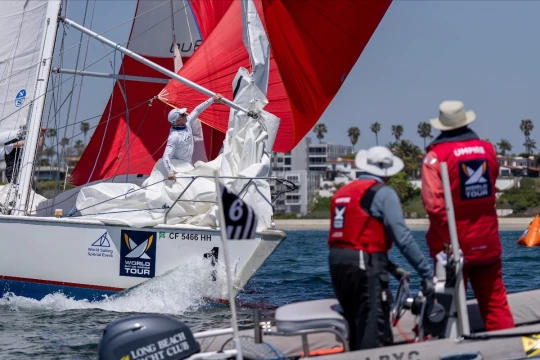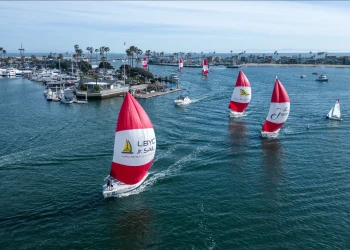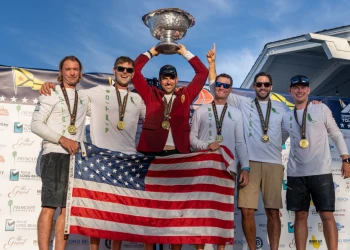
Photos: Bronny Daniels LBYC
Congressional Cup: Poole, Williams, Borch and Johnson advance to semifinals
After three days of double round robin racing in the 58th Congressional Cup by Long Beach Yacht Club, Chris Poole (USA), Ian Williams (GBR), Jeppe Borch (DEN) and Nick Egnot-Johnson (NZL) have advanced to the semifinals.
Going into Day Three of this prestigious World Match Racing Tour opening event Poole remained undefeated; while Borch and Williams looked solid. But the fourth and final slot in the semis was up for grabs. With six flights remaining, Egnot-Johnson and Eric Monnin (SUI) were in the hunt, while a rally from Megan Thomson (NZL) or Harry Price (AUS) could also have turned the tables.
After a six-race slump, Egnot-Johnson rebounded to take match 17 over Thomson, when she was OCS; putting Egnot-Johnson and Monnin in a sudden death position. "We knew it was him or us," Monnin described, "but it was all decided at the start. We wanted the pin end, but he got the side we wanted and there was never anything we could do."
In better breeze Egnot-Johnson commanded the race to triumph in that tie-breaking match. "We are thankful to get the win and stoked for more racing tomorrow," he said.
Monnin added, "We did some great things this week, we had an incredible groove," and thanked his team; which includes his wife Ute. The newlywed Monnins had honeymooned at Congressional Cup 2021, and missed 2022 with the birth of their son. This year they returned with baby Max and grandma Maria in tow.

Racing throughout the Congressional Cup has been tight and aggressive. Chief Umpire Philippe Michel announced there were over 95 protests on Day Two, resulting in 16 penalties by the on-the-water umpiring team. "Massive pressure" on the officials he conceded; with a sizeable commitment by the LBYC organizers, as umpires on RIBs trail each opponent around the entire course, during every single match.
"It's a very big line item in the budget, flying in umpires from around the world so we have the highest level of professionals here at the Congressional Cup," said Kirk Brown, a renowned International Umpire and Judge. At today's post-race press conference, Brown was honored for his years of service to the yachting community.
As a Grade One event the Congressional Cup is mandated to have this prominent group of umpires, in order to handle the exacting and instantaneous on-the-water justice this level of yacht racing demands. But it wasn't always this way. Previously, when a match racing competitor felt their rival had broken one of the intricate rules, they'd protest: waving a red flag at the time, and continuing with a protest hearing after the races.
"It was like a trial," explained Brown. "After the race the parties would come in and they would have a trial in front of a jury on how and what happened. But it's really difficult to come in off the water and explain what happened. One side has one view and the other side's got a different view. How do you sort that out? So the protest hearings would run well into the night: 1a.m., 2 a.m. ... It was horrible."

Brown was among a team of racing pros and authorities who helped Congressional Cup pioneer on-the-water umpiring 35 years ago. "We came up with an idea that we would have live field-of-play officiating. It had been somewhat piloted in a couple of other places, but the Congressional Cup was the first major event to do on-the-water umpiring."
"We were making up the rules as we went along," Brown admitted. "Every night as we debriefed with the sailors the rules would change, and how we would call the game changed. We'd ask, 'Well how did that work?' and 'How did this work?' Umpires were learning how to umpire; we were on 30-foot powerboats ... it was certainly very different than it is today."
"Field-of-play officiating originated here at the Long Beach Yacht Club," Brown added with pride. "It speeds up the process. You know who won right away." It also gives competitors a chance to clear a foul on the course, versus getting thrown out of the race in the protest room.
"So you can exonerate and continue sailing. Yesterday Ian Williams had a penalty coming into the leeward gate, rounded, and was able to shed the penalty by putting a penalty on the other boat, and go on to win the race. So it's no longer a death penalty if you break the rule: you still have a chance to win and that is a big part of keeping the game moving and keeping it exciting."





